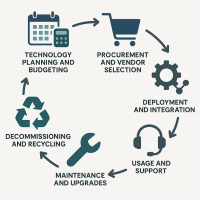Engineering Technology Purchases and Lifecycle Management Guidelines

Why We Are Doing This
The UVA Engineering School strives to provide a secure, supportive, and efficient computing environment for all our faculty, staff, and students. By employing standards for computer lifecycle management, and software purchases, the School aims to ensure that everyone in the Engineering Community has access to secure, reliable and up-to-date technology that enhances productivity, supports research, and fosters a collaborative academic and research community.
Benefits for the Engineering School and University Community:
- Enhanced Security: Regular updates and centralized management protect sensitive data and personal information.
- Improved Performance: Up-to-date devices ensure consistent and efficient operation by reducing downtime and technical issues.
- Cost Efficiency: Lifecycle management planning ensures School resources are used effectively and securely.
- Support and Maintenance: Prioritized support for fully supported devices means quicker resolutions to technical problems.
- Lower licensing liability risk: Software is appropriately procured and evaluated for IT security risk.
Definitions
- University Funds: Include faculty start-up funds, grant and contracts, graduate and undergraduate tuition, gifts, and endowments managed by the faculty, departments, and school.
- Computers: Electronic devices including laptops, tablets, desktop workstations, network-attached devices, data-monitoring computers, application-hosting servers, and data-storage servers.
- Employee: All faculty, staff, students, or other constituents employed by the Engineering School who use Engineering owned computers.
- Engineering Hardware Refresh Program: Provides computers to eligible full-time faculty and staff members on a four-year replacement cycle with a corresponding warranty. Both Windows and Apple computers are selected to meet standard academic, administrative, and faculty primary computing needs.
- LSP: Local IT service providers.
- T&E card: Travel and entertainment card, the preferred method of payment for all employee-initiated travel, meals, and entertainment expenses. Use of T&E cards for the purchase of computers is discouraged.
- Life cycle management: involves planning, deploying, maintaining, and retiring computer systems, ensuring optimal performance, cost-effectiveness, and security throughout their lifespan.
Standards
Ownership and Management:
Computers purchased with University funds, regardless of funding source, are the property of the University.
Departments, Units, faculty, staff, and students are responsible for:
- adhering to university technology policies, standards, and guidelines.
- the care and physical security of University computers assigned to them.
- following school and UVA Procurement procedures when purchasing, transferring, disposing of or otherwise removing University computers from University's ownership.
- the return of all University-owned computers to the School upon separation with the University.
Engineering Local Service Providers (LSP) are responsible for:
- ensuring that Engineering computers adhere to university security standards and asset lifecycle procedures.
- ensuring that every computer has an Engineering IT identified inventory agent tool installed or is recorded in the Engineering data repository and is reviewed according to School policy.
- responding to ITS’s annual security attestation distributed by the Engineering IT Team with timely and accurate data.
Purchasing and Configuration:
Departments, Units, Faculty, staff, and students are responsible for:
- reaching out to their LSP to discuss their needs and begin the procurement process.
- seeking pre-approval to purchase computers and software services using a T&E card.
- only using approved and ITS security-reviewed software.
Engineering Local Service Providers (LSP) are responsible for:
- working with faculty, staff, and students to review and determine their computer needs and make recommendations on all new computer and software purchases.
- adding the newly purchased computers to the school or department inventory and tagging them as university property.
- installing configuration and security management software on all Engineering computers. Configuration and security of all Engineering School network connected devices must follow the University Data Protection Standards.
- primary support of Engineering computers.
Exceptions:
Department, units, faculty, staff and students who wish to request exceptions from adhering to University IT policies related to security patching, support, or network connection must submit an exceptions request using this form Request an Exception to a Security Policy, Standard, or Procedure>
Related University Policies and Standards
- IRM-003: Data Protection of University Information
- IRM-004: Information Security of University Technology Resources
- IRM-009: University Information Technology Infrastructure, Architecture, and Ongoing Operations
- IRM-011: University Information Security Program
- IRM-017: Records and Information Management
- FIN-013: Permanent Transfer of Equipment Assets to or from the University
- FIN-034: Accounting Requirements for Equipment Assets
- FIN-052: Fixed Assets Accounting and Reporting of Equipment Acquired for Sponsored Programs
- PRM-016: Surplus Property Disposal
- RED-002: Ownership, Retention, Safeguarding, Management, and Transfer of Research Records
- Security of Connected Devices Standard
- Engineering School Hardware Refresh Program